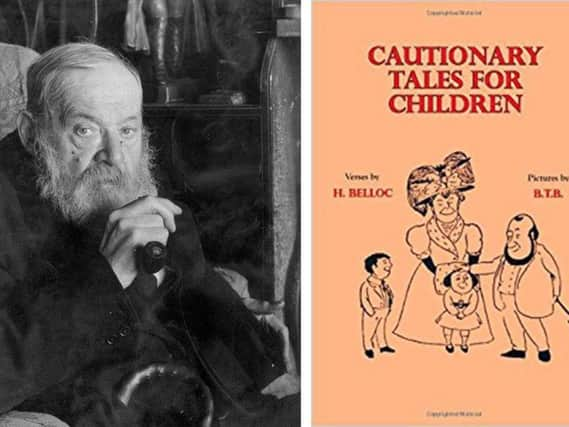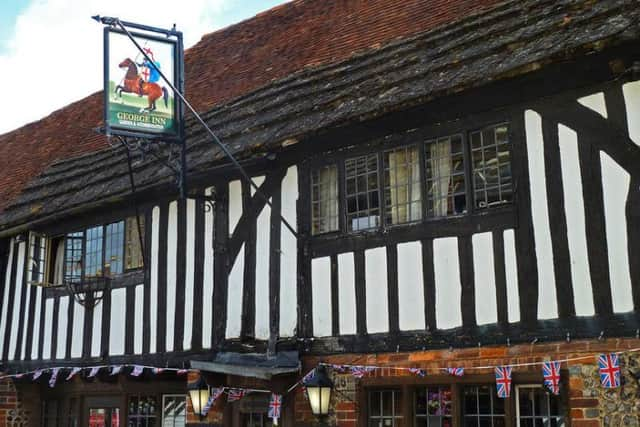Hilaire Belloc championed the great inns of Sussex


This saying is sometimes attributed to Hilaire Belloc, the half-French writer and historian who adopted Sussex as his spiritual home and waxed lyrical about the county’s landscapes. He was also particularly fond of her inns.
It is true that Belloc left us a plethora of quotations but I’m not sure he was responsible for this particular one though he was almost certainly aware of it and may even have repeated it on occasion. What we do know is that the year in question was 1525, give or take a few months on either side. In this time turkeys from the New World were first imported here. “Heresy” concerns the influence of Martin Luther who from Germany was challenging the beliefs and clerical pomp of the Catholic Church across Europe.
Advertisement
Hide AdAdvertisement
Hide Ad“Hops and beer” refers to the plants being cultivated in large quantities in South East England from that time. But beer itself was here long before 1525. We know this from a record made in 1400 that refers to “barrels of biere” coming to England from France. At the time our home-grown equivalent was a rather sweet mead-like ale made in Sussex from a barley base and sold by ale-wives.


There is also evidence that hops too were here prior to 1525. Some eight decades ago a certain Mr. P.E. Jones was examining old documents housed in the Guildhall Records Office when he came across a Royal Proclamation made by Henry VI in 1436 that gave the King’s protection for those engaged in the cultivation of hops. The measure was apparently aimed at the ale-wives who - fearing for their livelihoods - sought to banish hops. One rumour had it that “biere” was an insidious poison and would surely decimate England’s menfolk if allowed to spread unchecked.
Henry’s support for hops was emphatic: “Biere brewers should in no wise henceforth desist from brewing biere which many of our subjects relish preferring to drink it as a notable, healthy and temperate drink, but should boldly make, sell and exercise as they were wont to make, sell and exercise before these times.”
Powerful stuff. I think His Majesty must surely have enjoyed a pint! For certain Hilaire Belloc considered beer to be a wonderful thing and wrote to say so at every opportunity. His highest praise for Sussex inns was contained in his book “The Four Men: A Farrago” in which he recounts a memorable journey made across the county in the company of three delightfully eccentric companions - “Grizzlebeard”, “The Poet” and “The Sailor”. For three days and nights they largely subsist on Sussex beer as they make their way from Robertsbridge in the east to West Harting on the other side of the county, taking in Heathfield, Uckfield, Ardingly, Ashurst and Amberley en route. At one point Belloc is horrorstruck to observe a grumpy old man drinking tea in beer’s inner sanctum: the bar of an old inn.
Advertisement
Hide AdAdvertisement
Hide AdBelloc’s love of Sussex pubs and his fear that they might disappear is best expressed in this sentiment from 1912: “From the towns all inns have been driven; from the villages most … Change your hearts, or you will lose your inns, and you will have deserved to have lost them. But when you have lost your inns, drown your empty selves – for you will have lost the last of England.”


Though born in France, Belloc grew up in Sussex and spent his boyhood in Slindon. In 1906 he purchased a property called King’s Land at Shipley, West Sussex, where he brought up his five children. The writer’s wife Elodie died from influenza in 1914. Though they were very different characters, Hilaire Belloc also had a family tragedy in common with that other great champion of Sussex, Rudyard Kipling. The latter’s son John was killed at the Battle of Loos in September 1915 while Belloc’s son Louis died in Northern France in August 1918 when his Sopwith Camel was hit by anti-aircraft fire near Remy and crashed into trees. Hilaire’s youngest son, Peter, had G.K. Chesterton as his godfather. Peter became a Captain in the Royal Marines upon the outbreak of the Second World War. He died from pneumonia in April 1941. By then Hilaire was suffering from senility and at the funeral seemed unsure as to which of his sons was being buried.
Hilaire Belloc himself died just four days before his 83rd birthday in July 1953. He had been dozing by the fireplace in his daughter’s home and awoke somewhat bewildered. Evidently disorientated, he fell into the flames and succumbed to his burns in hospital.
Hilaire Belloc has left us with a rich heritage of quotations. He evidently had no time for statisticians: “It has long been recognized by public men of all kinds that statistics come under the head of lying, and that no lie is so false or inconclusive as that which is based on statistics.”
Advertisement
Hide AdAdvertisement
Hide AdBelloc could display self-deprecating humour: “When I am dead, I hope it may be said: His sins were scarlet, but his books were read.”
I also very much like this observation: “There was a shepherd the other day up at Findon Fair who had come from the east by Lewes with sheep, and who had in his eyes that reminiscence of horizons which makes the eyes of shepherds and of mountaineers different from the eyes of other men.”